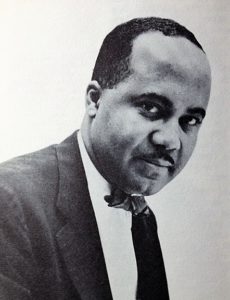Charles Nelson, Program Development and Coordination
This division developed general guidelines and policies for program development and operations and recommends the allocation of resources among regions and types of projects. It developed and negotiated all project proposals which were interregional in scope.
 Charles Nelson worked his way through Lincoln University with the usual college jobs—washing dishes, working as a library researcher—and one of the marked distinction—making corn flakes during the summers at the Kellogg’s factory in his home town of Battle Creek, Michigan.
Charles Nelson worked his way through Lincoln University with the usual college jobs—washing dishes, working as a library researcher—and one of the marked distinction—making corn flakes during the summers at the Kellogg’s factory in his home town of Battle Creek, Michigan.
After graduating in the social and behavioral sciences, Nelson went through Officers Candidate School in the Army and was assigned in 1942 to a tank-destroyer battalion with which he landed at Omaha Beach in France after D-day.
The battalion participated in three European campaigns as it rolled across France, Germany and Austria. The advance ended at Innsbruck where at the end of the war Nelson moved into the military government, serving as Mayor Telfs, Austria, and Teisendorf, Germany. Discharged a a captain in 1947, he returned to his studied.
In 1952, Nelson joined the Federal Government and was sent to the Philippines as director of a training program which brought some 400 Filipinos to the United States for study each year. When Ramon Magsaysay became president of the island republic, Nelson joined his staff as an adviser on civil service problems. He also helped organize Magsaysay’s sweeping program of rural improvement and assisted in getting the program started. During his six years in the Philippines Nelson took four months’ leave to work as adviser to the Egyptian Ministry of Education in Cairo.
Two years in Tehran as director of Iran’s community development program for the U.S. aid mission was followed by a period of African studies—at Boston University, Oxford University, and universities in France and Belgium. In 1951, Nelson moved to Washington as Chief of the Latin America and Africa branches of the international Cooperation Administration’s Community Development Division.
A telephone call from Warren Wiggins brought Nelson into the task force study group which laid the foundations of the Peace Corps, and immediately after the formal establishment of the new agency, he journeyed to Ghana, Nigeria and once again to the Philippines to negotiate the first Peace Corps programs in those countries. “A fresh visit to those nations caused me to recognize the kind of contribution that Volunteers might make through a Peace Corps program,” he said. “It is a contribution not only to the nation served but to our own nation as well. Neither they nor we have had enough opportunity to get to know the other.”
“Here is a movement
whose express
purpose is to over-
come the disastrous
barriers that have
hitherto segregated
the affluent Western
minority of the
human race from
the majority of their
fellow men and
women.”
–Arnold Toynebee
“There are many
who doubted whether
a Peace Corps concept
was feasible. Now,
after a year in
operation, there are
few voices raised in criticism.”
–Senator Prescott
Bush (Rep.-Conn.)
No comments yet.
Add your comment